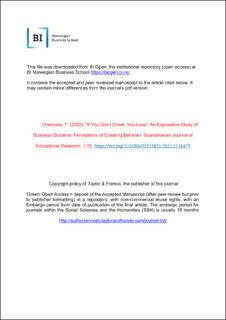| dc.contributor.author | Grenness, Tor | |
| dc.date.accessioned | 2023-09-27T08:05:07Z | |
| dc.date.available | 2023-09-27T08:05:07Z | |
| dc.date.created | 2022-10-10T10:10:02Z | |
| dc.date.issued | 2022 | |
| dc.identifier.citation | Scandinavian Journal of Educational Research. 2022, . | en_US |
| dc.identifier.issn | 0031-3831 | |
| dc.identifier.uri | https://hdl.handle.net/11250/3092246 | |
| dc.description.abstract | Student academic dishonesty is a pervasive problem for higher education institutions all over the world. The purpose of the present study is to take an interpretative, qualitative approach intended to understand student thinking and reflections when it comes to the perceived seriousness and prevalence of cheating. Peer interviews, i.e., students interviewing students, were chosen as the data collection method. Open and analytical coding based on the principles of grounded theory provided the foundations for the analyses. Overall, the results of this study support previous correlational findings, but they also demonstrate that many students tend to talk about cheating as if it is “part of the game”. It furthermore seems that students rate different forms of cheating from less to more serious, and that some forms of cheating are not perceived as cheating at all. “Everybody else does it” is obviously a widespread belief, which easily leads to—as one informant expressed it—“if you don’t cheat, you lose”. In order to deal with student cheating, the students themselves recommended fewer take-home examinations and more use of continuous assessment. The findings further indicate that schools should make an effort to build a “non-cheating culture”. Rather than punishing students, convincing them that normal behavior is not to cheat, and that cheating benefits no one is probably the best way to deal with this behavior. | en_US |
| dc.language.iso | eng | en_US |
| dc.publisher | Taylor & Francis | en_US |
| dc.rights | Navngivelse-Ikkekommersiell 4.0 Internasjonal | * |
| dc.rights.uri | http://creativecommons.org/licenses/by-nc/4.0/deed.no | * |
| dc.subject | Student cheating | en_US |
| dc.subject | peer interviews | en_US |
| dc.subject | business students | en_US |
| dc.subject | cheating culture | en_US |
| dc.subject | moral standards | en_US |
| dc.subject | extrinsic motivation | en_US |
| dc.title | “If You Don’t Cheat, You Lose”: An Explorative Study of Business Students’ Perceptions of Cheating Behavior | en_US |
| dc.title.alternative | “If You Don’t Cheat, You Lose”: An Explorative Study of Business Students’ Perceptions of Cheating Behavior | en_US |
| dc.type | Peer reviewed | en_US |
| dc.type | Journal article | en_US |
| dc.description.version | acceptedVersion | en_US |
| dc.description.version | publishedVersion | en_US |
| dc.rights.holder | Taylor & Francis | en_US |
| dc.source.pagenumber | 15 | en_US |
| dc.source.journal | Scandinavian Journal of Educational Research | en_US |
| dc.identifier.doi | 10.1080/00313831.2022.2116479 | |
| dc.identifier.cristin | 2059941 | |
| cristin.ispublished | true | |
| cristin.fulltext | original | |
| cristin.fulltext | postprint | |
| cristin.qualitycode | 2 | |

